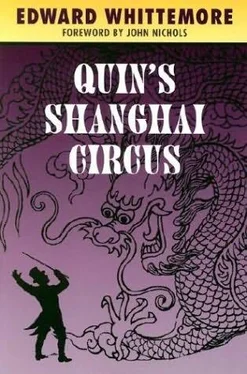Edward Whittemore - Quin’s Shanghai Circus
Здесь есть возможность читать онлайн «Edward Whittemore - Quin’s Shanghai Circus» весь текст электронной книги совершенно бесплатно (целиком полную версию без сокращений). В некоторых случаях можно слушать аудио, скачать через торрент в формате fb2 и присутствует краткое содержание. Жанр: Фэнтези, на английском языке. Описание произведения, (предисловие) а так же отзывы посетителей доступны на портале библиотеки ЛибКат.
- Название:Quin’s Shanghai Circus
- Автор:
- Жанр:
- Год:неизвестен
- ISBN:нет данных
- Рейтинг книги:3 / 5. Голосов: 1
-
Избранное:Добавить в избранное
- Отзывы:
-
Ваша оценка:
- 60
- 1
- 2
- 3
- 4
- 5
Quin’s Shanghai Circus: краткое содержание, описание и аннотация
Предлагаем к чтению аннотацию, описание, краткое содержание или предисловие (зависит от того, что написал сам автор книги «Quin’s Shanghai Circus»). Если вы не нашли необходимую информацию о книге — напишите в комментариях, мы постараемся отыскать её.
Quin’s Shanghai Circus — читать онлайн бесплатно полную книгу (весь текст) целиком
Ниже представлен текст книги, разбитый по страницам. Система сохранения места последней прочитанной страницы, позволяет с удобством читать онлайн бесплатно книгу «Quin’s Shanghai Circus», без необходимости каждый раз заново искать на чём Вы остановились. Поставьте закладку, и сможете в любой момент перейти на страницу, на которой закончили чтение.
Интервал:
Закладка:
He gave Quin some training and received orders to send him on to Moscow. It was not until several years later in Shanghai, after Adzhar had removed himself from espionage work, that he learned from a young American woman that his former pupil Quin had received intensive training at the school outside Moscow and been assigned to a mission in China.
Adzhar was disturbed by Lenin’s New Economic Policy after the Russian civil war. When Lenin died in 1924 he decided to give up his clandestine activities and return to the study of languages. He was then over sixty. The time had come to retire, he felt.
Thus he severed forever all connections with the Comintern.
From Paris he went to the Middle East, intending to learn Punic and Ugaritic, Mandaean and Nuzi Akkadian. He did learn them, but while in Jerusalem he met for the second time a man he had known five years before in France, a man he admired exceedingly, a Japanese diabetic who had converted to Judaism since they had last seen each other.
This man was Rabbi Lotmann, formerly Baron Kikuchi of the powerful landowning clan in northern Japan. Lotmann discussed the Orient with Adzhar, and it was because of him that Adzhar decided not to tarry in the Middle East but to continue his journey as far east as one could go.
In Malabar, where he stopped briefly to acquire fluency in Kulu and Kota and Toda, he fell in love with a young woman of wealth and married her, the only time he ever married, so long had it taken him to recover from the loss of Sophia.
His wife was a Nestorian Christian, a member of that nearly extinct sect that had flourished in the early Middle Ages. As a child she had fed her horse from a helmet that had been worn by a soldier in Tamerlane’s army. Either that experience or the trading traditions of her fathers, who had sold their peppercorns to both East and West, had caused the young woman to dream of someday going to Samarkand to visit the tomb of Tamerlane, from where she hoped to follow the silk route of antiquity through central Asia, perhaps as far as Peking. In the thirteenth century, after all, a Nestorian monk from Peking had traveled west to discuss theology with the pope and had continued on to Bordeaux, where he gave communion to Edward I of England. Why not reverse the journey? Lastly there was the inducement of a pilgrimage to the famous monument that Chinese Nestorians had erected at Hsian-fu in the eighth century.
Adzhar was delighted when he heard all of this. He and his wife went to Goa to organize a caravan and there found an omen of the misfortune to come.
Goa is built on hills and the sewerage system consisted of open drains cleaned by pigs that wandered the city. At the time they arrived there a band of Arabs had just sailed into port with a shipload of powerful drugs, some suspected of being from as far away as Mexico. The Portuguese were celebrating Easter with these drugs, the Arabs were celebrating Ramadan, and the Indians were supplicating their usual multitude of spring deities.
The problem was that the drugs were much stronger than anyone suspected. They were so lasting that many of their properties passed right through the body of the user, causing a phenomenon known as the high hogs of Goa. For several weeks the entire population had to remain locked indoors on their hills, without food or water, terrorized by marauding hordes of tipsy, careening pigs driven mad by the sewerage in the open drains.
Finally Adzhar and his young wife and the infant daughter recently born to them were able to set out in their caravan. They reached Samarkand without incident and turned east to cross central Asia. Along the trail of the ancient silk route Adzhar continued to acquire new languages, Kashgarian and Yakandian, Taranchi, Uzbek and Sart, Harachin, Chanar. All went well until they sighted the Gobi Desert. At an oasis on the fringe of the desert they were attacked without warning by a tribe of bandits appearing from nowhere.
Adzhar was away from the camp at the time. His daughter was playing under a blanket and escaped notice, but his wife and all the bearers were decapitated. Adzhar shouldered his daughter and crossed the Gobi on foot, his daughter dying of thirst before he reached another oasis.
At last he arrived in Shanghai in 1927, the year the Communist uprising failed there, the same year Trotsky fell from power in Russia.
Father Lamereaux paused to pour himself another glass of whiskey.
As it happened, he whispered, a remark Adzhar made during his first days in Shanghai had an enormous influence on modern Chinese history.
When he arrived in the city his only interest was in learning the Kiangsi and Hakka dialects, to go with those he already knew, so that he could read the regional commentaries on the Chinese classics before continuing on to Japan. But at the same time, remembering his own experiences with the czarist police, he could not help but be sympathetic with the revolutionaries who were being hunted down in Shanghai and shot. Consequently he hid a number of them in his home until a way could be found for them to escape from the city.
One of these Chinese was an urbane scholarly man who had studied in Europe and had been one of the leaders of the uprising. He and Adzhar got into the habit of having long philosophical discussions to pass the hours. Not surprisingly, like Trotsky in the Bronx, the Chinese was depressed over the recent disaster to his cause.
Sometimes, he said one evening, despair paralyzes us. We become like an animal in the dark that can neither see nor hear nor smell.
I know that despair, said Adzhar. On one occasion I knew it particularly well. I was living with the Lapps and it seemed I would never escape those frozen regions where the darkness closes around you and closes in. But then the Lapps with their reindeer taught me what to do and taught me well, for remember no one knows such a night as they do above the Arctic Circle.
And what did they tell you?
What I’ve done all my life since then. Move. March.
Where?
What does it matter? All good roads are within. Mine has been a long one and perhaps your march must be long as well.
The scholarly Chinese smiled at Adzhar, for as they both knew, the Lapp proverb he had quoted was nothing more than the way of the Tao. He smiled at Adzhar, but he remembered the wisdom of the remark because it came from a man who had known many strange corners of the world.
A few days later the Chinese was able to escape from Shanghai. During the next few years he knew many more disasters, until finally a moment came when he and his comrades were completely surrounded by armies that far outnumbered them.
By then the scholarly revolutionary had risen high in the ranks of the party. Each night after a day of hopeless warfare the weary leaders sat down on the ground to discuss their desperate situation, and each night Adzhar’s friend argued with the others to accept the advice he had heard while hiding in Shanghai.
Almost all the other leaders disagreed with him. What he was proposing was failure and defeat. They still controlled this one area of the country, and the peasants there were loyal to them. If they left it they would have nothing. They would be nothing.
So they argued, but Adzhar’s friend was clever and eventually he won them over. The order was given to march and they did, six thousand miles in all, a march that saved them from extinction and became a mystical unifying force that brought them to power in the end.
A long voyage? Perhaps. Yet not as long as the voyage of a shoemaker’s son from Georgia.
Adzhar busied himself with Chinese dialects, but very soon he was experiencing a new kind of restlessness, the most profound he had ever known. He used to speculate that it had come to him because he had crossed the Gobi Desert on foot, although frankly I see no connection whatsoever between the two. Then at other times he claimed the original cause of the restlessness might have been more general and unspecified than one would expect, perhaps merely a routine result of having arrived in the East after so many decades of wandering. Lotmann favored the latter explanation and as proof quoted the story of Elijah and the ravens, which had saved his own life, but in the end who is to say? In any case the restlessness amounted to this.
Читать дальшеИнтервал:
Закладка:
Похожие книги на «Quin’s Shanghai Circus»
Представляем Вашему вниманию похожие книги на «Quin’s Shanghai Circus» списком для выбора. Мы отобрали схожую по названию и смыслу литературу в надежде предоставить читателям больше вариантов отыскать новые, интересные, ещё непрочитанные произведения.
Обсуждение, отзывы о книге «Quin’s Shanghai Circus» и просто собственные мнения читателей. Оставьте ваши комментарии, напишите, что Вы думаете о произведении, его смысле или главных героях. Укажите что конкретно понравилось, а что нет, и почему Вы так считаете.












